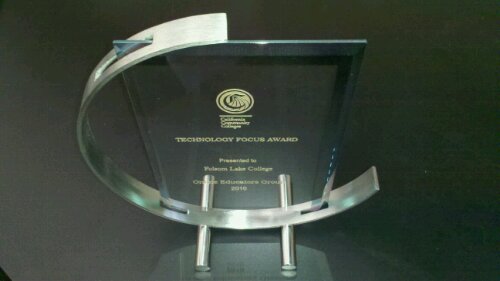
Congratulations FLC Online Educators, winners of the California Community Colleges Chancellor’s Office 2010 Technology Focus Award!

Congratulations FLC Online Educators, winners of the California Community Colleges Chancellor’s Office 2010 Technology Focus Award!
Skype in the classroom is a free community to help teachers everywhere use Skype to help their students learn. It’s a place for teachers to connect with each other, find partner classes and share inspiration. This is a global initiative that was created in response to the growing number of teachers using Skype in their classrooms.
Check out the Projects section, a clearinghouse for various projects, to get an idea of what other educators are doing with Skype. You can sort by age group and subject area, and even search for guest speakers.
We’ve talked a lot about the boundaries between personal and professional use of social media, so I thought you would find this article interesting:
Those who use their Twitter accounts for both personal and professional purposes often find themselves wondering whether they are damaging their credibility with funny anecdotes or social tweets. According to a study published in the March issue of Learning, Media and Technology, however, the answer to that question is a resounding “no.”
Turns out that humanizing your Twitter presence makes you more credible.
A while back, I learned about the California Community College Chancellor’s Office’s Technology Focus Award:
The Technology Focus Awards recognize excellence that evolves out of a comprehensive planning process closely linked to the institution’s mission and vision for the future. The award commends strategic and integrated, uses of technology that empower faculty and/or students through sources within reach of all campus constituents, and often the wider community.
With significant help from Jennifer, I nominated the FLC Online Educators, and we won! I’ll be attending an awards ceremony in April, and I’ll bring back something – a plaque? a trophy? – so that we can build a shrine in the Innovation Center.
Details here – https://misweb.cccco.edu/techawards/docs/TechAwardProgramBrochure.pdf
Becky Mendell (via Lorilie Roundtree) found/forwarded this, about an embedded librarian:
What if a reference librarian was assigned to a college course, to be on hand to suggest books, online links, or other resources based on class discussion? A media-studies course at Baylor University tried the idea last semester, with an “embedded librarian” following the class discussion via Twitter.
Anybody want to give this a shot?
HandBrake is a free program that allows you to grab video from DVDs and save it as a file on your computer, saving you time in the classroom. In other words, instead of skipping around inside a DVD to find the relevant section, you can simply save the relevant portion as a file that can be played immediately. The program is available for Mac, Win and Linux, and the user manual is here. It’s pretty straightforward – put in the DVD, run HandBrake, choose specific chapters (or the whole DVD), and click Start. The end result is a digital video file saved to your computer.
Even though this kind of use is likely a Fair Use, it was formerly a violation of the DMCA’s anti-circumvention provisions. This changed in the latest exemption language, which states:
(1) Motion pictures on DVDs that are lawfully made and acquired and that are protected by the Content Scrambling System when circumvention is accomplished solely in order to accomplish the incorporation of short portions of motion pictures into new works for the purpose of criticism or comment, and where the person engaging in circumvention believes and has reasonable grounds for believing that circumvention is necessary to fulfill the purpose of the use in the following instances:
(i) Educational uses by college and university professors and by college and university film and media studies students;
(ii) Documentary filmmaking;
(iii) Noncommercial videos.
You can read the whole text here.
Note – I am not a lawyer, and whether or not something qualifies as a Fair Use is a decision made by judges in courts. That being said, fill out a Fair Use Checklist and keep it in a drawer somewhere, and you’ve probably done your due diligence. YMMV.
Further reading:
Code of Best Practices in Fair Use for Scholarly Research in Communication
Read about it here.
I’m exploring BitTorrent as a distribution mechanism for some locally-produced instructional videos. Yet another reason that restricting entire categories of Internet traffic is a less-than-desirable approach.
New options for comment, discussion, critique, etc. Continuing on some of the themes from last year’s report, particularly with regard to mobile, key trends are:
Discuss. 🙂
A new report from the Center for American Progress deals with online education and its potential disruptive impact on systems of higher ed. While I’m still digesting the report, my initial reaction is this: the most disheartening conclusions of this, and most other reports of the “what’s wrong with higher ed?” variety that seem to be proliferating these days is that they seem to be based on a one-dimensional, inhuman philosophy of education. While it might seem a naive stance in these troubled financial times, I became an educator because I believe that the value of learning can’t simply be measured, as the report suggests, by some formula “composed of the 90-day hire rate plus change in salary over some amount of time divided by total revenue per conferral plus retrospective student satisfaction plus the cohort repayment rate indexed to credit scores.” This is why I find the recent “limiting by way of financial starvation” of the mission of the California Community Colleges so disturbing, not to mention intellectually dishonest. In other words, there’s more to education, to learning, than its ability to make a person a better wage earner. Maybe I’m old-fashioned – I suppose educators don’t read Paulo Freire anymore?